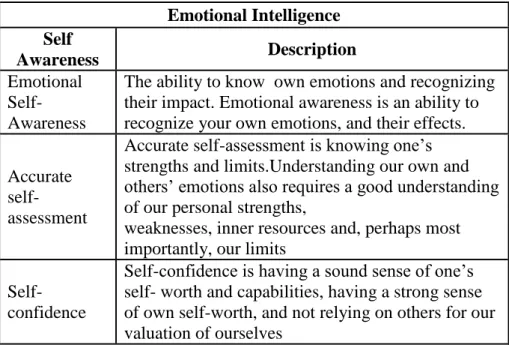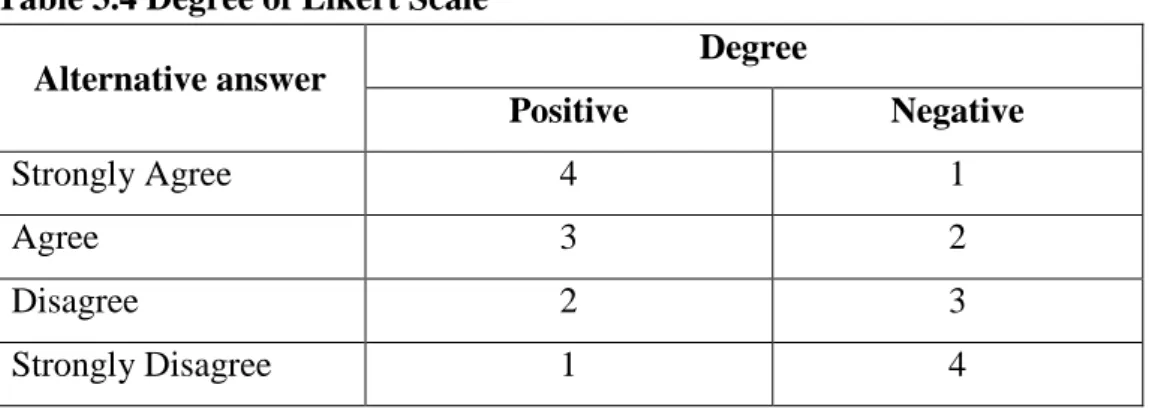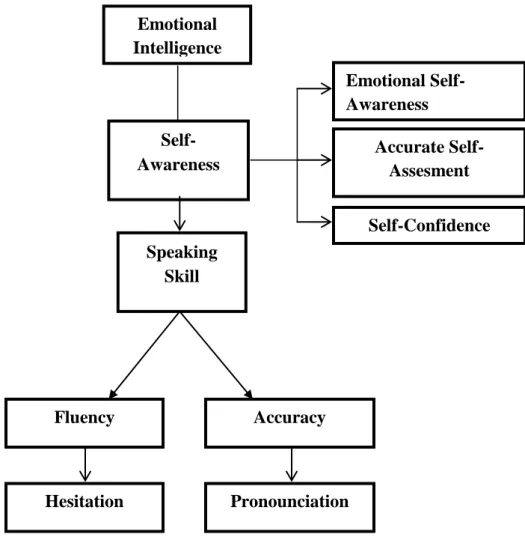The Influence of Emotional Intelligence in Speaking Ability (A Descriptive Study at the English Department, Muhammadiyah University of Makassar. The author completed her thesis with the title "The Influence of Emotional Intelligence in Speaking Ability (A Descriptive Study at the English Department , Muhammadiyah University of Makassar)" which aims to complete a partial fulfillment for Degree of Strata-1 (S1) in the Faculty of Teacher Training and Education. Therefore, the author would like to welcome and constructive suggestions and criticism to improve this thesis make.
INTRODUCTION
- Problem Statement
- Objective of the Research
- Significance of the Research
- Scope of the Research
What is the impact of emotional intelligence in terms of self-awareness on students' speaking ability in the English Department of Muhammadiyah University of Makassar. To find out the influence of emotional intelligence in terms of self-awareness on the speaking ability of students in the English Department of Muhammadiyah University of Makassar. To find out the speaking ability of students in the English Department of Muhammadiyah University of Makassar.
LITERATURE RIVIEW LITERATURE RIVIEW
Theory of Influence
- Positive Influence
- Negative Influence
- Teaching Speaking
- Aspect of Speaking
- Speaking Performance
The ability to communicate in a second language clearly and effectively contributes to the student's success in school and success later in all phases of life. These students define fluency as the ability to speak with others, the ability to read, write or understand spoken language. Fluency is the ability to speak at length with few pauses/hesitations, be able to produce sentences coherently, reasoned and semantically.
Emotional Intelligence
- Self Awareness
- Emotional Self-Awareness
- Accurate Self-Assessment
- Self-Confidence
- Self-Management
- Social-Awareness
- Relationship-Management
In addition, Ahmadi (2014: 3) emotional intelligence is the ability to recognize, understand and manage moods and feelings, both in oneself and in other people. These qualities are essential for helping professionals and key components of emotional resilience. Emotional intelligence has both interpersonal aspects (i.e., social intelligence) and intrapersonal elements (i.e., self-awareness). Interpersonal emotional intelligence helps people develop confident and empathetic relationships with others, while intrapersonal emotional intelligence.
In reality, emotional intelligence is a kind of ability to judge individual trends and execute them in different ways. According to Goleman (1995:9), self-awareness is the ability to understand one's own emotions and their effects on one's performance. McGonian self-awareness is the ability to realize what we do as we do it, and to understand why we do it.
Kight (2014:17) Self-awareness is an honest understanding of your values, desires, thought patterns, motivations, goals and ambitions, emotional responses, strengths and weaknesses, and effect on others. Once developed and practiced regularly, mindfulness enables you to manage your behavior, improve your interactions and relationships, and gain or increase your influence. Objective consciousness is described as the process in which the self directs its attention inward, while subjective consciousness is when attention is directed away from the self.
Building on the understanding you've gained with self-awareness involves controlling your emotions so they don't control you.

Self-Awareness and Emotional Intelligence
This means using awareness of your own emotions and feelings to build a strong relationship. It involves identifying, analyzing and managing relationships with people inside and outside your team and developing them through feedback and coaching. Gill explains that the first key aspect of emotional intelligence is related to self-awareness, which refers to the ability to recognize and understand one's own moods, emotions and instincts and how they affect others.
Exploring life skills, the tutorials contain a range of material related to wellbeing and mental health. Arguably, it can be concluded that through student engagement, awareness can be raised as reflective practice is formed through the interpretation of the mental health video.
Self Awareness and Speaking
Zahavi's phenomenologists do not defend strong theses about complete and infallible self-knowledge, but point to the constitutive connection between experiential phenomena and first-person givenness or accessibility. They emphasize the importance of considering the first-person perspective in elucidating phenomenal consciousness. When talking about first-person perspective, it is important to make a clear distinction between having such a perspective and being able to articulate it linguistically (it will eventually be characterized as weak and strong first-person perspective).
Conceptual Framework
METHODOLOGY METHODOLOGY
Research Subject
Purposive sampling, which is one of the most common sampling strategies, groups participants according to preselected criteria related to a particular research question. The researcher applied to the third semester students of the English Education Department of Makassar Muhammadiyah University in the academic years 2017/2018.
Instrument of the Research
- Speaking Test
- Questionnaires
Do not allow anyone else to answer or give his/her opinion on the question on behalf of the participant. You don't want to give the respondent an idea of your personal opinion on the topic. If the participant does not understand the question, repeat the question and ask them to give the best answer, or you can choose to skip the question.
A questionnaire as a data collection technique is done by giving the respondent a series of questions or a written statement to answer (Sugiyono. In this study, use a Likert scale instrument. A Likert scale is used to measure attitudes, opinions, someone or some people of a show on social phenomena (sugiyono.
Technique of Collecting Data
Technique of Data Analysis
- The Result of Self-Awareness on Speaking Ability
- The Result of Students’ Speaking Ability in the Aspect of Pronounciation and Hesitation
The students speak very hurriedly, and more sentences are inappropriate with the pronunciation and little or no communication. The findings of the study present the result of students' speaking ability level, which is correlated with emotional intelligence. It can be concluded that the self-awareness indicator emotional awareness had no influence on speaking skills.
The result was that the indicator of self-awareness, accurate self-assessment, affects speaking ability. Calculation of the data of each indicator Table of self-awareness 4.2 Assessment of students' self-awareness according to questionnaires. The table shows how much the students achieved in the questionnaires according to individual indicators of self-awareness.
The result of students' speaking ability in the aspect of pronunciation and hesitation and hesitation. The following table was the result data of the students' speaking ability in the aspect of pronunciation and hesitation taken from the interview. The table above calculated that average score of students' speaking, where speaking ability in the aspect of pronunciation was higher than hesitation at the average score 6.67 and 6.60.
Based on the classification standard, the speaking ability of the superior students was classified and considered average in terms of pronunciation and hesitation.

Discussions
- The influence of Self-Awareness on Speaking Ability
- The Students’ Speaking Ability
The reason why it could be deduced from the data analysis is that the students who are a little concerned and well emotional will get a good score in speaking. While the students who have great worries, low self-confidence and bad emotions can still calm down when they are talking. The students may have many ideas about their main issues, but they cannot talk because they are very worried about everything.
Some were worried that the disciples had, because they were worried that they would say the wrong thing, that they might beat themselves when they spoke, and they didn't want to try because they didn't know their own strength. This means that confidence was needed when students were speaking, especially in front of the class. The researcher also surveyed students as respondents to obtain a descriptive analysis of their speaking ability.
In addition to the interview, the researcher was also given a descriptive analysis with which he could analyze the students' speaking ability. Based on the interview data, the total score and also the average score would be calculated. The researcher evaluated the students' ability in terms of pronunciation and hesitation in speaking.
Meanwhile, the students' fluency aspect assessed hesitation, among the 28 students who had been interviewed.
Conclusion
You could see that some students have difficulty speaking because they cannot overcome their feelings and emotions while speaking. And also when the students speak, they worry a lot about mistakes, they don't know their strengths and limitations. Students' fluency in aspects of pronunciation and hesitation calculated from interviews, for example, of their pronunciation.
Some of the students have a low pronunciation because they rarely practice especially in front of their friends, they were shy to speak up, but generally it is average. It could be seen from the mean score that the mean value of pronunciation and hesitation was not far on the score 6.67 and 6.60, and categorized as Average.
Suggestion
When learning to speak, we should pay attention to all students and create a fun atmosphere and an engaging method, so that the students enjoy practicing and practicing with pleasure. The students were allowed to increase their self-awareness when learning to speak, because the students felt that speaking is difficult. The students need self-awareness to increase their speaking skills and from the teacher, how they make the students speak with pleasure and pleasure.
It is expected that this research can be used as an example for further research with other discussion in the future and the researcher hopes that the further research will be more creative to find the solution to their problem. Gill.2014.The nature of reflective practice and emotional intelligence in tutorial settings.Canadian Center of Science and Education.Journal of Education and Learning. 2013.The Importance of Emotional Resilience for Staff and Students in the 'Helping' Professions: Developing an Emotional Curriculum .University of Bedfordshire.
The study of the phenomenon of hesitation as a cognitive process in the oral production of Iranian French learners. English language and literature and teaching English language and literature for secondary schools. Specialty. Department of English and American Studies.
The Researcher
Where is the location of Losari Beach?
What is in Losari Beach?
How the view of Losari Beach?
Come to the class and give permission to the teacher and also ask the class leader to inform his friends. 3 Sure with practice, I will be successful in speaking SA A D SD 4 I don't like being criticized by my friends SA A D SD 5 I do something that can increase creativity SA A D SD 6 I feel shy when I speak in front of the class SA A D SD 7 Always difficult to make sense when I speak. 10 I am sure that with great confidence, I will do my best SA A D SD 11 Feel pessimistic in front of their friends SA A D SD 12 Feel confident in front of their friends SA A D SD adopted (in Silfa Nugrawati "skripsi" 2016).



